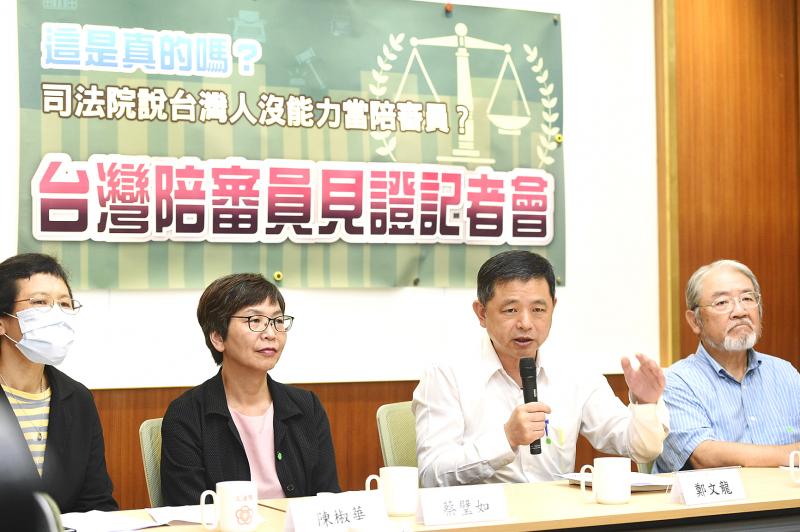A group of legal reform advocates yesterday pushed for a jury — instead of a lay judge — system in the nation’s quest for judicial reform, saying it would make for more democratic and impartial rulings.
“Top Judicial Yuan officials have been telling the public that Taiwanese do not understand what a jury system is, using it as an excuse to oppose its implementation. I am riled up by such talk, which is disparaging and discriminates against our own people,” Taiwan Jury Association founder Jerry Cheng (鄭文龍) told a news conference in Taipei.
“Our party supports a jury system, as public satisfaction with court rulings on many criminal cases is very low,” New Power Party Legislator Chen Jiau-hua (陳椒華) said. “There are also problems with political interference and ‘dinosaur judges’ who make rulings contrary to society’s expectations.”

Photo: George Tsorng, Taipei Times
“We believe a jury system can better serve and protect the public,” Chen added.
More than 80 to 90 percent of people do not trust court judges, so the Legislative Yuan must do more to restore public trust in the justice system, Taiwan People’s Party Legislator Tsai Pi-ju (蔡壁如) said, adding that during her stint at the Taipei City Government, a simulation court with a jury system was put in place, which produced very good results, to the satisfaction of the people involved.
Many Taiwanese who have emigrated to North America and hold dual citizenship have served as jury members in the US or Canada, Cheng said, putting the figure at between 500,000 and 1 million.
He estimated that one in 23 of these Taiwanese have already served, or are qualified to serve as jury members.
Besides, most Taiwanese have the competency, social experience and comprehension to make a jury system work if it is implemented, he said.
One such Taiwanese who had lived in US is Kuo Chung-kuo (郭重國), who was invited to the news conference to discuss his experience.
“US statistics showed that 95 percent of decisions made by juries were correct... It is not easy for 12 people to totally agree on one matter, but juries were able to make correct decisions, which proved to be right most of the time,” he said.
The US has used a jury system for criminal prosecution for more than 200 years, he said.
“In the early days when the US was just opening up its western region, there was no questioning if the public lacked the comprehension or understanding of issues to serve on the jury,” he said.
“There is no perfect system for law and justice, but a jury system is on the right path toward a real democratic and impartial process,” he added.
Cheng and other legal reform advocates have blasted the Judicial Yuan and the Democratic Progressive Party for promoting a bill for a lay judge system, which Japan, for one, uses.
That could become law after a third reading and legislative vote later this year.
The Judicial Yuan’s version only permits citizens to serve as lay judges and work alongside professional judges in criminal trials, but the real authority and decisionmaking power would still held by professional judges, Cheng said.
It is a “fake judicial reform” as the lay judge system does not allow citizens to really participate in the judicial process, and it is a hidden way for the Judicial Yuan to block the jury system, he added.

The brilliant blue waters, thick foliage and bucolic atmosphere on this seemingly idyllic archipelago deep in the Pacific Ocean belie the key role it now plays in a titanic geopolitical struggle. Palau is again on the front line as China, and the US and its allies prepare their forces in an intensifying contest for control over the Asia-Pacific region. The democratic nation of just 17,000 people hosts US-controlled airstrips and soon-to-be-completed radar installations that the US military describes as “critical” to monitoring vast swathes of water and airspace. It is also a key piece of the second island chain, a string of

A magnitude 5.9 earthquake that struck about 33km off the coast of Hualien City was the "main shock" in a series of quakes in the area, with aftershocks expected over the next three days, the Central Weather Administration (CWA) said yesterday. Prior to the magnitude 5.9 quake shaking most of Taiwan at 6:53pm yesterday, six other earthquakes stronger than a magnitude of 4, starting with a magnitude 5.5 quake at 6:09pm, occurred in the area. CWA Seismological Center Director Wu Chien-fu (吳健富) confirmed that the quakes were all part of the same series and that the magnitude 5.5 temblor was

The Central Weather Administration has issued a heat alert for southeastern Taiwan, warning of temperatures as high as 36°C today, while alerting some coastal areas of strong winds later in the day. Kaohsiung’s Neimen District (內門) and Pingtung County’s Neipu Township (內埔) are under an orange heat alert, which warns of temperatures as high as 36°C for three consecutive days, the CWA said, citing southwest winds. The heat would also extend to Tainan’s Nansi (楠西) and Yujing (玉井) districts, as well as Pingtung’s Gaoshu (高樹), Yanpu (鹽埔) and Majia (瑪家) townships, it said, forecasting highs of up to 36°C in those areas

IN FULL SWING: Recall drives against lawmakers in Hualien, Taoyuan and Hsinchu have reached the second-stage threshold, the campaigners said Campaigners in a recall petition against Chinese Nationalist Party (KMT) Legislator Yen Kuan-heng (顏寬恒) in Taichung yesterday said their signature target is within sight, and that they need a big push to collect about 500 more signatures from locals to reach the second-stage threshold. Recall campaigns against KMT lawmakers Johnny Chiang (江啟臣), Yang Chiung-ying (楊瓊瓔) and Lo Ting-wei (羅廷瑋) are also close to the 10 percent threshold, and campaigners are mounting a final push this week. They need about 800 signatures against Chiang and about 2,000 against Yang. Campaigners seeking to recall Lo said they had reached the threshold figure over the